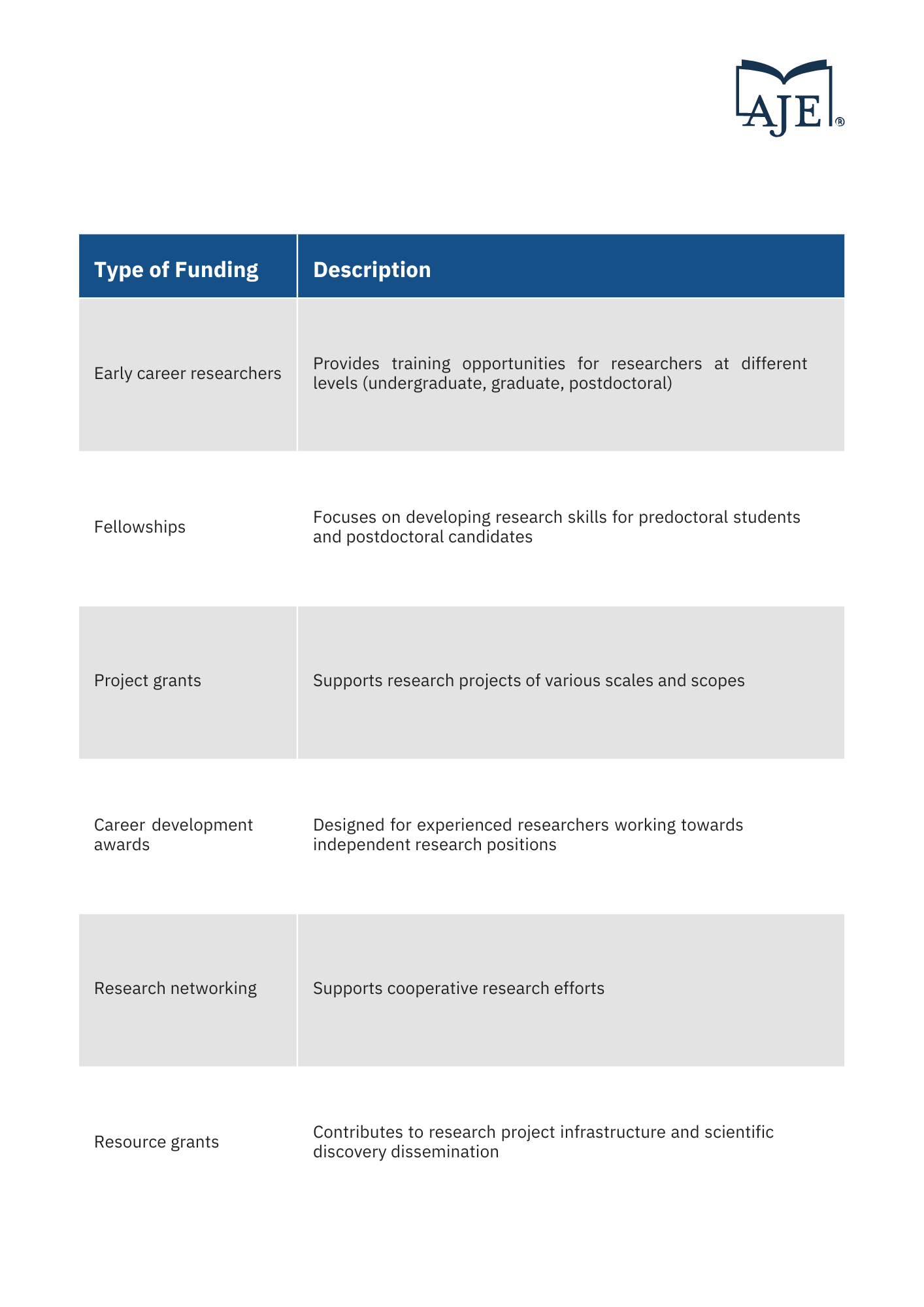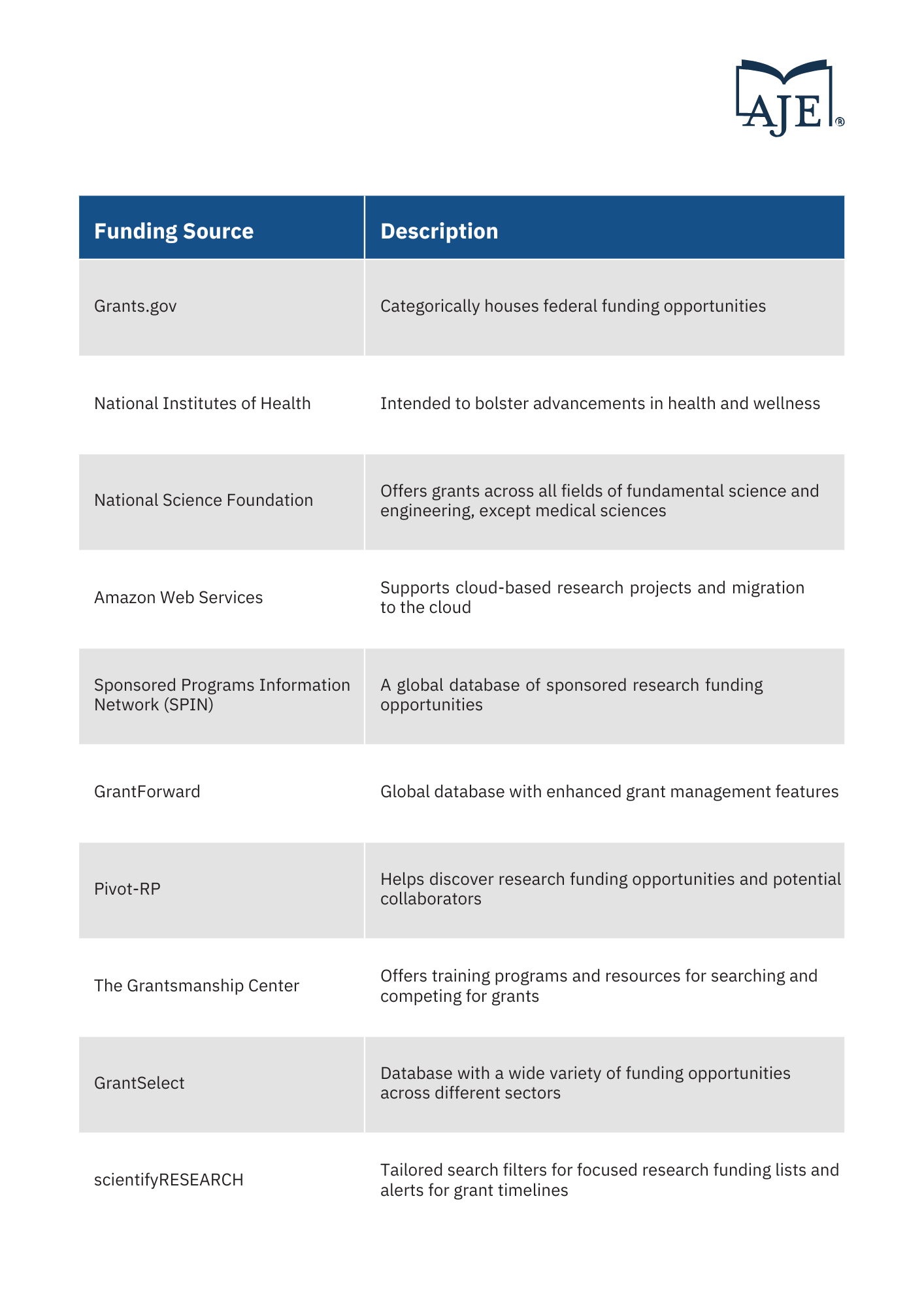Where to Find Grant Opportunities for Research
In this blog, we go over many different types of research funding, where to find grant opportunities, and other ways to secure grant funding for your research.
Updated on January 3, 2024

Research projects are often complex endeavors. They take time, effort, supplies, and services. Because creating a suitable infrastructure for carrying out research comes with expenses, researchers regularly search for grants to fund these projects.
Countless organizations offer grant funded opportunities for researchers. They vary from local to global, public to private. Many prioritize specific fields of study or types of research projects. They all include unique application parameters, and require careful planning and execution of the grant proposal.
Most researchers agree the process for identifying, applying for, and securing a grant and capital is complicated and overwhelming.
By discussing the different types of research funding available, outlining some of the primary channels, and exploring other non-traditional means, we take some of the guesswork out of this unavoidable task that can make or break your research project.
In this blog, we will go over many different types of research funding, where to find grant opportunities, and other ways to secure grant funding for your research.
What are some types of research funding?
Some of the main categories for funding in research are outlined here with reference to both a common name and a specific National Institutes of Health (NIH) title:
1) Early career researchers
Referred to as Research training (T series) by the NIH- Provides individual training opportunities to researchers at the undergraduate, graduate, and postdoctoral levels.
2) Fellowships
NIH (F series)- Another form of early career grant that focuses on developing the research skills of predoctoral students and postdoctoral candidates.
3) Project grants
Labeled Research grants (R series) by the NIH- Intended to support research projects of all scales and scopes.
4) Career development awards
NIH (K series)- Designed for more experienced researchers working towards independent research positions.
5) Research networking
Considered Program project/ center grants (P series) by the NIH- Supports various cooperative research efforts.
6) Resource grants
NIH (various series)- Contributes support to research project infrastructure and to the dissemination of scientific discovery.

Where to find grants for research?
When it comes to grants for research, the sources of funding fall into several distinct classifications. A grant may be offered internally to researchers through their affiliated institution or organization. Or, it may be afforded by an external source of either privately or publicly held donors at the local, state, federal, or international levels.
While there are numerous repositories filled with information about research grants, they are not necessarily accessible to everyone. There are some that allow for an individual paid subscription but many others require institutional subscriptions and only offer access to those with a direct association.
Though it may take a little more diligence, all this valuable information regarding research grant opportunities is public and can be located and utilized for free. Here are some of the most comprehensive and widely used grant resources available to researchers:
- Grants.gov: Categorically housing federal funding opportunities, this database offers information on over 1,000 grant programs. Indispensable as a free resource for learning how to navigate the grant process, searching and filtering through grants from various federal agencies, and applying and tracking submissions in a centralized workspace.
- National Institutes of Health (NIH): Intended to bolster advancements in health and wellness, the NIH awards numerous types of grants to support all facets of research. The free site provides step-by-step assistance with their grants process from planning and submission to award and closeout.
- National Science Foundation (NSF): With 15 areas of focus, the NSF offers an array of grants across all fields of fundamental science and engineering, except the medical sciences. For no charge, they assist researchers with finding funding, preparing and submitting a proposal, and managing the funds after the award.
- Amazon Web Services (AWS): The AWS Cloud Credit for Research is a global program that supports finite projects for building cloud-hosted services, software, and tools or that migrates a research process or open data to the cloud. The site outlines proposal preparation and all pertinent instructions for submission.
- Sponsored Programs Information Network (SPIN): An institutional subscription is required to access this global database of over 40,000 sponsored research funding opportunities. The site allows for searching, saving searches, and setting up alerts.
- GrantForward: Through an institutional subscription, researchers can search over 63,000 funding opportunities housed within this global database. They offer several enhanced features for grant management and personalized recommendations.
- Pivot-RP: Scholars affiliated with a subscribed institution can use the Pivot tool to discover both research funding opportunities and potential collaborators. With its editorially curated database of global grants, tracking features, and personalized recommendations, the site is an effective resource.
- The Grantsmanship Center: Researchers can learn how to search and compete for grants through numerous training programs and informational webinars that have varying prices for members and non-members. They also offer free conversation series and grant-related resources.
- GrantSelect: Bringing together a wide variety of funding opportunities across all science, community, and business sectors, the GrantSelect database is straightforward and user-friendly. Both individual and institutional paid subscriptions are available.
- scientifyRESEARCH: Free trial and subscription models offered to both individuals and research offices. This database is accessible through tailored search filters that are used to create focused research funding lists and to set up alerts for grant timelines and new funding opportunities.

Are there other ways to fund research?
Clearly, there are considerable grant opportunities for funding research initiatives, but the process is not only time consuming and complicated but also exceedingly competitive. Thus, many researchers are thinking outside the box, towards less traditional means of funding to continue moving their research forward:
1) Charities and foundations: fund research that aligns with their missions
- Bill and Melinda Gates Foundation
- Barack Obama Foundation
- Mastercard Foundation
- Spencer Foundation
- Wellcome.org
- Mellon Foundation
2) Crowdfunding: active online fundraising through public donations
3) Angel investors, private investors, and venture capitalists: individual investors willing to negotiate terms of funding
4) Think Tanks: Though not funders of external research, think tanks host internal research programs carrying out fully funded projects.
5) Professional Associations, Industry Groups, Labor Organizations: fund research to further a specific agenda
Final thoughts
Research is hard. From developing a unique research question to experimenting and analyzing, and then writing, writing, and more writing, the challenges can seem endless. And each step comes with its own necessary resources and expenses.
Knowing what types of funding is available for your research and where to find it can alleviate some of the guesswork and stress. Explore the links outlined here to discover the perfect grant programs and other funding opportunities that will take your research from groundbreaking idea to world changing reality.